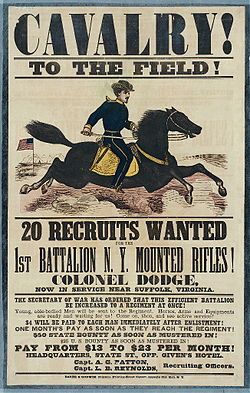 As the North tries to absorb the shock of the Union rout at the First Battle of Manassas/Bull Run, U.S. President Abraham Lincoln and the U.S. Congress act decisively and quickly. Using the defeat as a wake up call to recruit more volunteers for a war northern politicians fear will drag on without an adequate Union force, the president and Congress appeal to love of country in authorizing the recruiting of 500,000 more soldiers. Patriotism, the promise of a steady income and meals is enough to quickly fill the half-million quota. Among the volunteers are many abolitionists and immigrants.
As the North tries to absorb the shock of the Union rout at the First Battle of Manassas/Bull Run, U.S. President Abraham Lincoln and the U.S. Congress act decisively and quickly. Using the defeat as a wake up call to recruit more volunteers for a war northern politicians fear will drag on without an adequate Union force, the president and Congress appeal to love of country in authorizing the recruiting of 500,000 more soldiers. Patriotism, the promise of a steady income and meals is enough to quickly fill the half-million quota. Among the volunteers are many abolitionists and immigrants.
The amassing of such a large number of soldiers enhances the need for regimental chaplains. Standing militia laws require regimental chaplains during war time, recognizing that the nature of war makes religious counselors necessary for soldiers under duress, and contributes to the general emotional and psychological health of units. Reflecting the dominance of the Christian faith in America, only Christian ministers are allowed to fill chaplaincy posts.
“Appointment was vested in the regimental commander on a vote of the field officers and company commanders. A chaplain had to be a regularly ordained minister of a Christian denomination and received the pay and allowances of a captain of cavalry.”
During the war, the United States and the Confederacy handle chaplains differently. Union chaplains have authorized uniforms and are alloted rations, stationary and shelter. They can also request additional shoes and clothing. Despite official pronouncements of God’s guidance upon the South, Confederate chaplains receive none of these benefits. Chaplains of neither side receive formal training, supervision or ecclesiastical supplies. In addition, Confederate chaplains have no specific duties and are paid less than Union chaplains ($50-$80 monthly, compared to northern salaries of up to $100 monthly).
All totaled, Methodists and Presbyterian chaplains combined contribute the bulk of chaplains both North and South. Baptists, despite rivaling Methodists and Presbyterians in numbers of adherents, rank third in the number of chaplains contributed North and South. The primary reason for the low number of Baptist chaplains during the Civil War is the refusal of Baptists by and large, in the face of the denomination’s heritage of separation of church and state, to accept government-funded chaplain salaries.
Source: National Civil War Chaplain’s Museum (link); recruiting poster (link)


